World
World Champs women’s road race: Kopecky uses brains and brawn to defend world title – Escape Collective
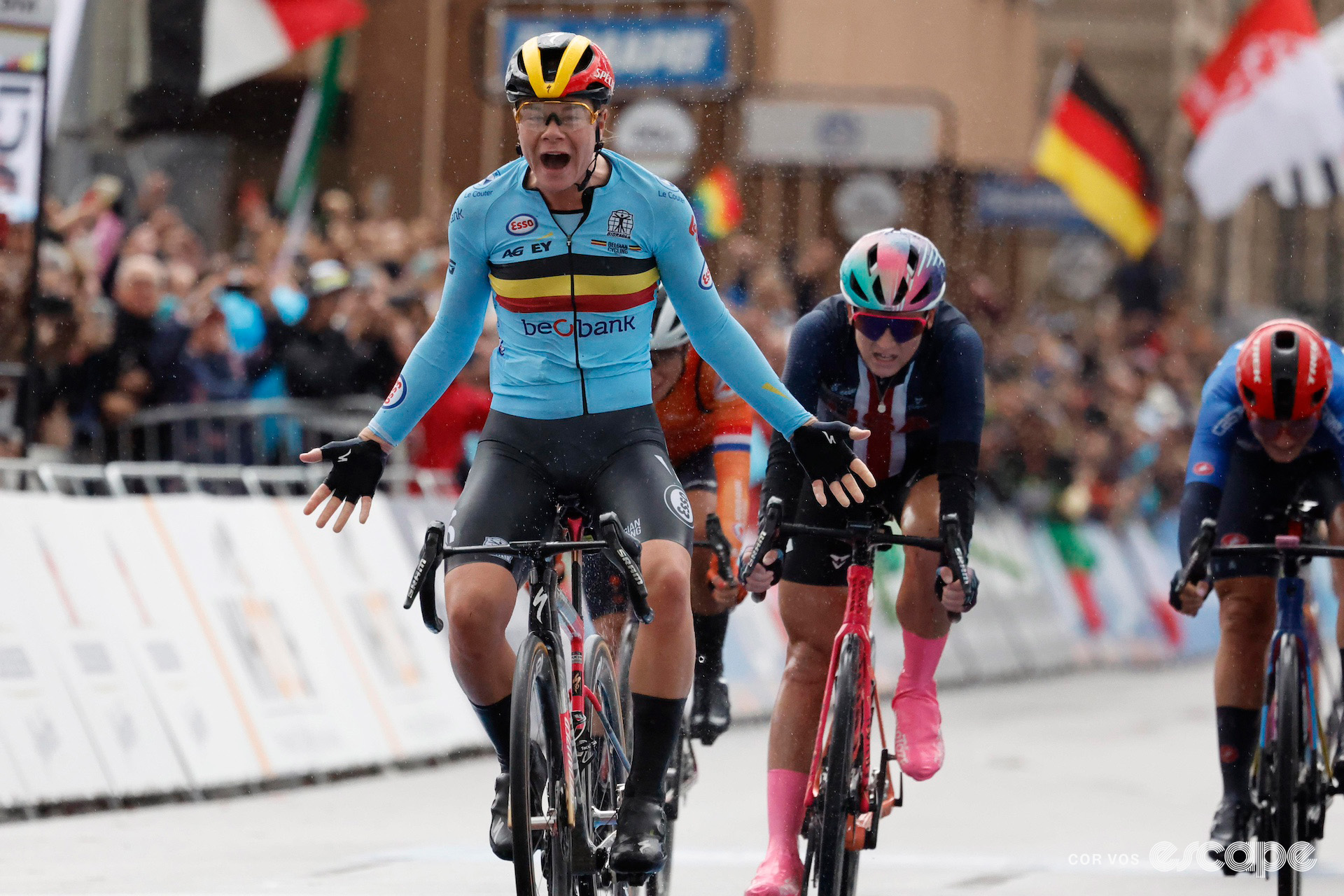
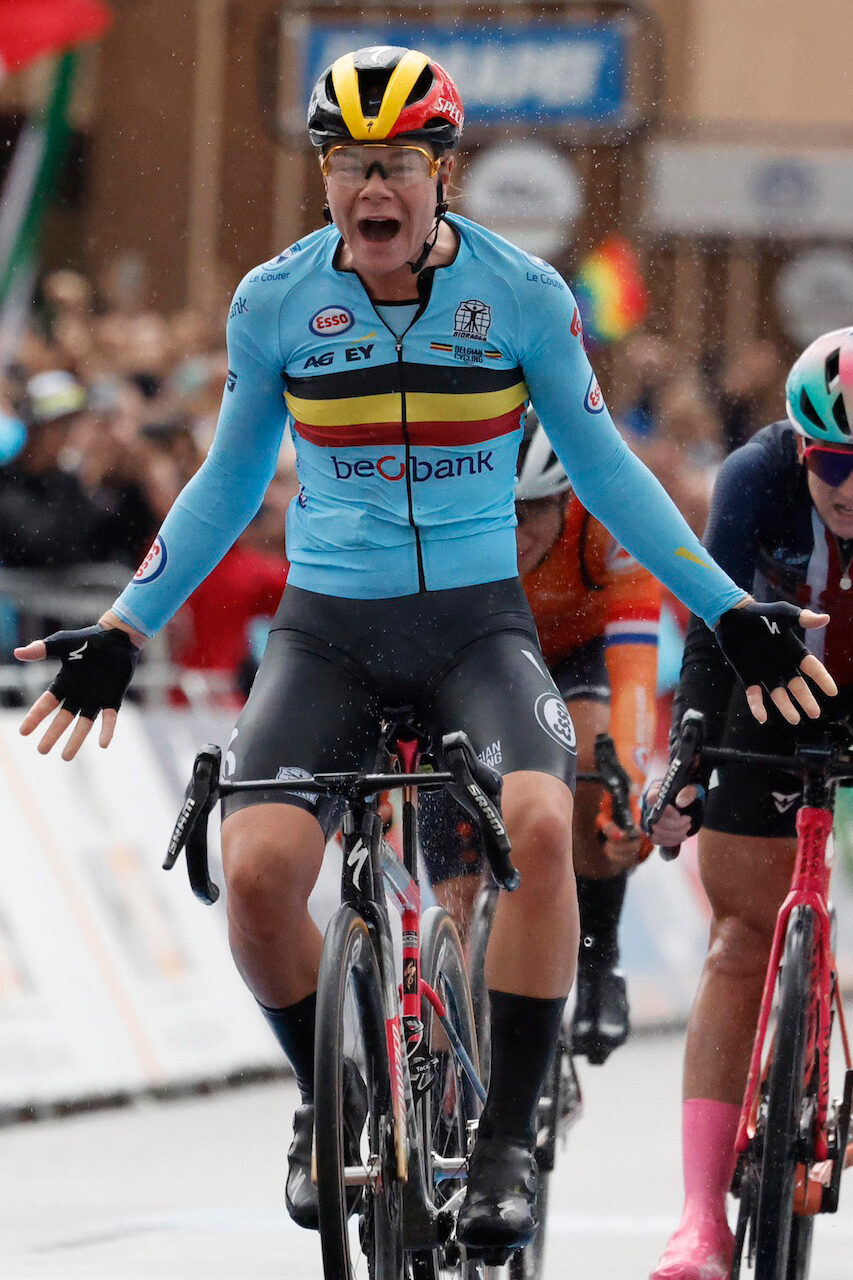
The super-strong Dutch team tried to divide and conquer, but they were out-played by the defending champion who rode a textbook race in grim conditions.
Lotte Kopecky (Belgium) wins the elite women’s road race at the 2024 World Championships. Photo: © Cor Vos
The conditions in Switzerland made for a very tough day out for the elite women’s World Championship road race, and after five laps of the hilly circuit local to Zurich, the title fight came down to a sprint from a small group, won by Belgian superhero Lotte Kopecky to successfully defend the rainbow jersey won in Glasgow.
There were one or two moments when it looked like Kopecky might be out of the picture when a combination of hills and the cold temperatures conspired against the Belgian champion of track and road, but Kopecky stayed patient throughout, even as the super-strong Dutch team confused the world with their aggressive and sometimes counter-intuitive tactics. By letting others chase and/or work themselves into a hole, Kopecky made her way back into contention after being dropped earlier in the final lap, and when Vollering responded to a Hail-Mary attack by Ruby Roseman-Gannon (Australia) in the final kilometre, the Belgian had her launchpad, and she out-sprinted the six-rider group to book another 12 months in the world champion’s rainbow jersey.
In the race within a race that is the Under-23 competition – for the last time – Puck Pieterse’s 13th place from the second chase group earned the 22-year-old Dutch rider her first rainbow jersey on the road, adding to the elite MTB title she earned at the start of this month, shortly after a stellar Tour de France debut.
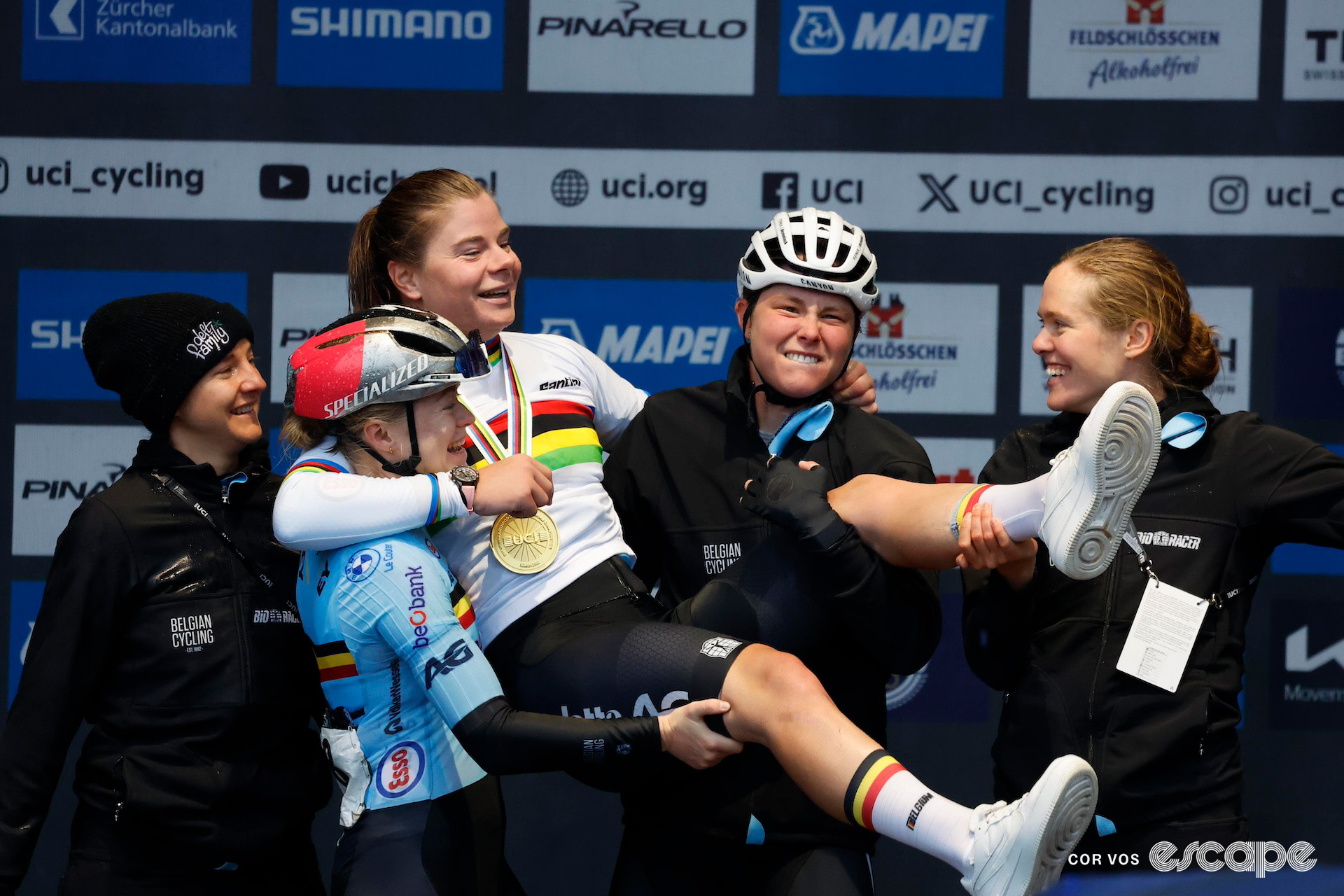
How it happened
- An already wet peloton of riders in a hodgepodge of national and team issue raincoats rolled out of Uster after a minute’s silence for young Swiss rider Muriel Furrer – after the 18-year-old’s death following the junior race on Thursday, her family insisted the UCI Road and Para-Cycling World Championships should go on.
- There was interest from a number of smaller nations to make the early move of the day, and wasn’t long before the trio of Caroline Baur (Switzerland), Sara Martín (Spain) and Nina Berton (Luxembourg) found a gap which stretched out towards two minutes on the way to the first major climb of the day.
- With the Polish and Dutch teams trimming the gap down to half a minute by the first passage of the finish line, the early move began to break up on Zurich’s Bergstrasse (800m at 7.1% average, max 17.2% near the top), and with 103 km to go, Berton and Martín were close enough for Thalita de Jong (Netherlands) and Julie Van de Velde (Belgium) to bridge. However, they were all caught within a few kilometres as the peloton arrived at the main climb of the day.
- The Witikon climb (1.4km at 7.2%) provided a launchpad for the next major move of the day as Niamh Fisher-Black (New Zealand) tested her legs and initiated a move that would eventually grow to 11: Fisher-Black, Justine Ghekiere (Belgium), Mischa Bredewold (Netherlands), Riejanne Markus (Netherlands), Soraya Paladin (Italy), Sarah Gigante (Australia), Elena Hartmann (Switzerland), Franziska Koch (Germany), Mie Bjørndal Ottestad (Norway), Christine Majerus (Luxembourg) and Urška Žigart (Slovenia).
- By 75 km, the Netherlands team had begun to thoroughly confuse with their tactics, having two strong riders out front and yet also setting a blistering pace in the bunch with Pauliena Rooijakkers leading the way for Demi Vollering.
- Under the power of Rooijakkers, it was all back together on the circuit’s main climb with 74 km to go, and for perhaps the only time in the race, the orange-liveried Dutch contingent looked organised as they controlled the bunch.
- The lull persisted until the penultimate ascent of the Bergstrasse where Vollering split the bunch to create an elite move of eight or nine riders with about 50 km left to race, but a lack of cohesion meant there was a regathering on the mid-circuit rollers.
- Caroline Andersson (Sweden) and Juliette Labous (France) both individually tried to go clear of the small peloton about 45 km out, but it wasn’t until Markus went on the attack – again – that a gap was established, only Ghekiere bridging to join the move.
- With riders from both the favourite nations up the road, there was a significant stalling in the chase, which allowed a large number of dropped riders to regain contact, including Dutch veteran Marianne Vos.
- The lack of radios seemed glaringly obvious as Vos attacked immediately as she caught back onto the idling bunch, presumably not yet knowing a strong teammate was up ahead, before briefly embedding herself in the wheels.
- Then, with the gap still almost half a minute wide, Bredewold and Pieterse appeared to work on the fast descent, reducing the gap to but a handful of seconds.
- Vos then launched out of the wheels and made fairly short work of bridging to Markus and Ghekiere, albeit making the tactical faux-pas of bringing a rival with her in the punchy Australian Ruby Roseman-Gannon, not a rider to be sniffed at.
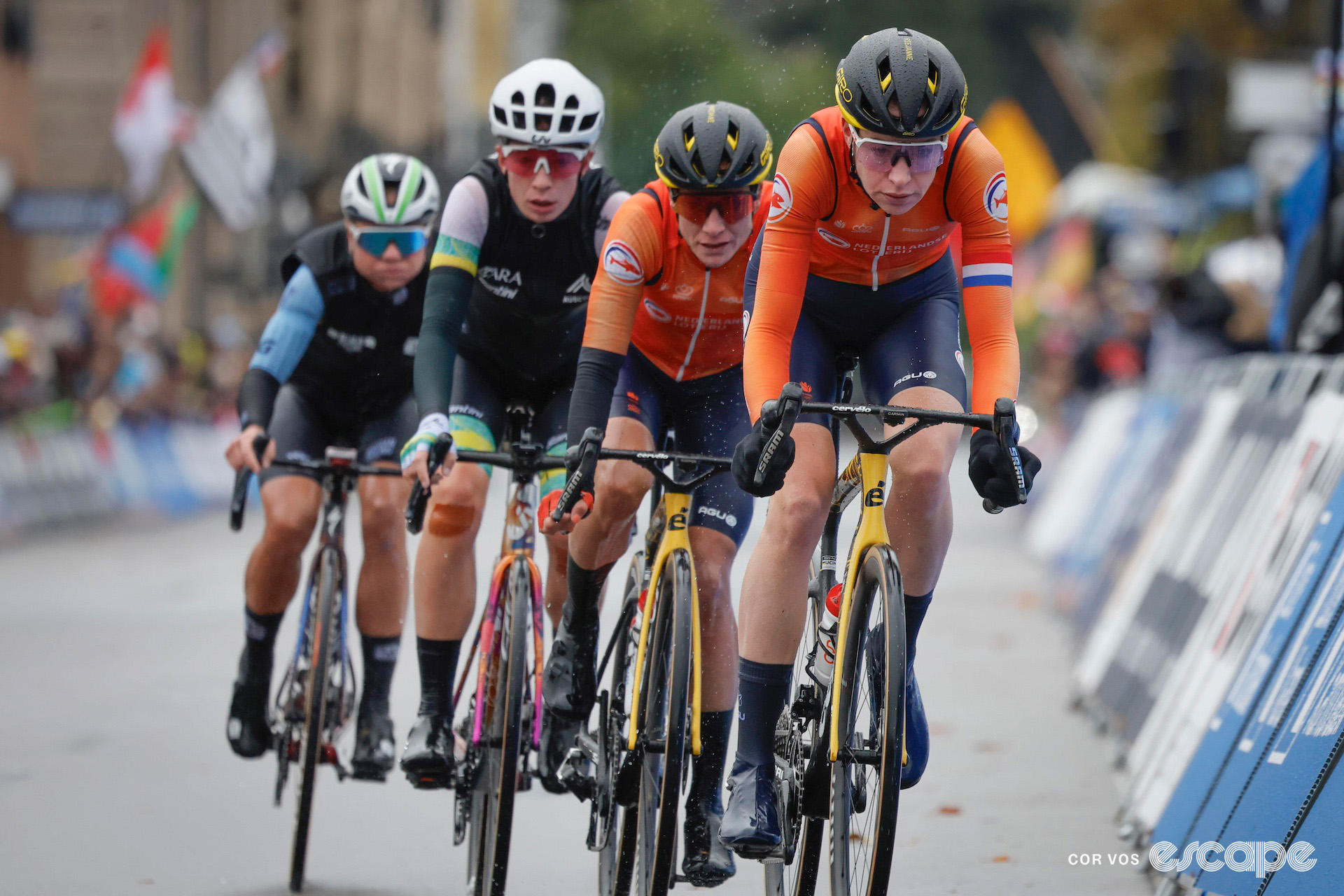
- With the Netherlands doing all the work in the breakaway and the peloton, the four leaders had an advantage of about a minute (reportedly – the time gaps weren’t always wholly believable) on the final passage of the finish line, 26.9 km left to race.
- Their days were numbered, though, and what looked like the decisive move was still to come as Kopecky, Vollering, Liane Lippert, Elisa Longo Borghini and Chloe Dygert broke clear of the rest of the bunch on the climbs and ate into the gap.
- Vollering and Longo Borghini were very focused on the defending champion, so when Kopecky looked to be struggling on the gradients, they pushed on, desperately forcing a wedging between themselves and the defending champ.
- A lack of cohesion and the climb not being quite long enough meant that the group swelled once more, but it wasn’t all bad as Vollering regained two teammates and Kopecky got Ghekiere back too.
- The Netherlands looked to be in control once more, but then Vollering put in an attack on one of the last short climbs, only succeeding in dropping her teammates.
- Whether that’s the moment she lost the race or just one of many is up for debate – it certainly didn’t help that Vollering took it upon herself to close down everything in the closing kilometres, including when Longo Borghini tried a flier from a few kilometres out, then again when Roseman-Gannon launched just after regaining contact in the final kilometre.
- With the Australian and Dygert bringing the group to six, Kopecky bided her time before soaring up the middle of the road. Longo Borghini and Dygert looked good as they opened up their own sprints, but Kopecky was the strongest, staying ahead to take a convincing victory in the torrential rain.
Loading…
Quotes of the day
Kopecky looked exhausted at the finish, despite the broad smile that etched her frozen features, her eyes puffy after over four hours in freezing rain. After paying tribute to Muriel Furrer and the Swiss elite women’s team, the back-to-back world champion described her race.
It was a really annoying day because it was raining and it wasn’t warm, but on the climbs it was warm and then in the downhill you got so cold and I was freezing at the end. But then I tried to stay as calm as possible, on the steeper climb I didn’t have any troubles and then on the longer one in the final time when Demi [Vollering] went I had some difficulties. But I just tried to stay at my own pace and come back … Then it was just trying to stay as cool as possible and use my energy in the right moment. The Australian rider [Ruby Roseman-Gannon] came from the back, Demi [Vollering] reacted immediately and that was perfect for me.”
The Dutch team faced – shivering – one big question in the mixed zone: what went wrong?
Having just completed her 17th elite World Championship road race, 18 years after winning her first, Marianne Vos answered pragmatically, indicating that it’s better to have tried and failed than not to have tried at all.
That’s also the game. Of course we are disappointed too. We didn’t come here to fall outside the podium. We did everything we could. In retrospect, you might have done it differently. That’s for sure.”
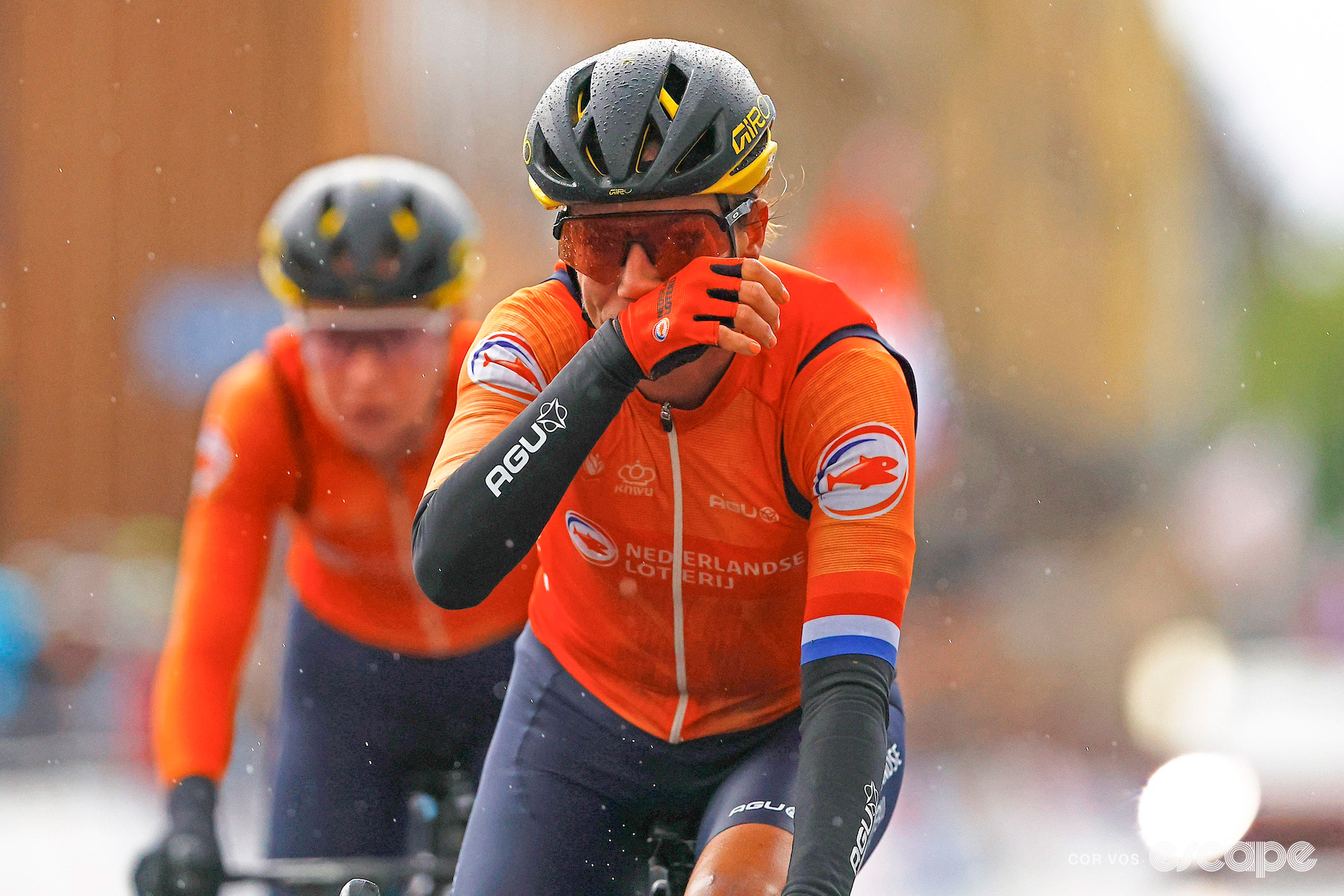
Brief analysis
- The Dutch delegation was the strongest at the race, and they knew it, they even seemed to embrace it. With as much strength as two teams or more, their aim looked at first to be ‘make it hard for everyone else’, and when they put strong riders up the road, it resembled a classic pass-the-buck move – but then they started working in the bunch too. At one point, there were two Visma-Lease a Bike jerseys (Vos and Markus) more or less racing their SD Worx compatriots (Vollering and Bredewold), rightly or wrongly sowing the idea of division within the Dutch camp. By the end of the race, they’d confirmed their strength, and yet still unravelled pretty spectacularly, Vollering their best finisher in fifth, with Vos and Markus making it three in the top 10.
- While the Dutch did everything and more in a desperate attempt to deliver … someone to victory, Kopecky cut a very different, very much calmer figure on the bike throughout the race – as did her teammate Ghekiere, winner of a stage and the polka-dot jersey at the Tour de France. The difference seemed to be that Kopecky was confident, and knew her form well enough to ride her own race, even if that meant letting go early in the last lap. She knew, though, that there were others, even rivals, she could depend on to re-enter the fray, and then all that remained was a sprint where her confidence ran over.
- Racing defensively and smartly also meant managing the group around her, and Kopecky did that with a combination of positioning and reading her rivals. That was particularly evident on the short ramp 11 km from the line where Kopecky sat second wheel and anticipated Lippert’s acceleration, which she firmly shut down with only a minor effort of her own – in contrast, Vollering was deep in the group so it would take a lot more work to respond.
What did you think of this story?









